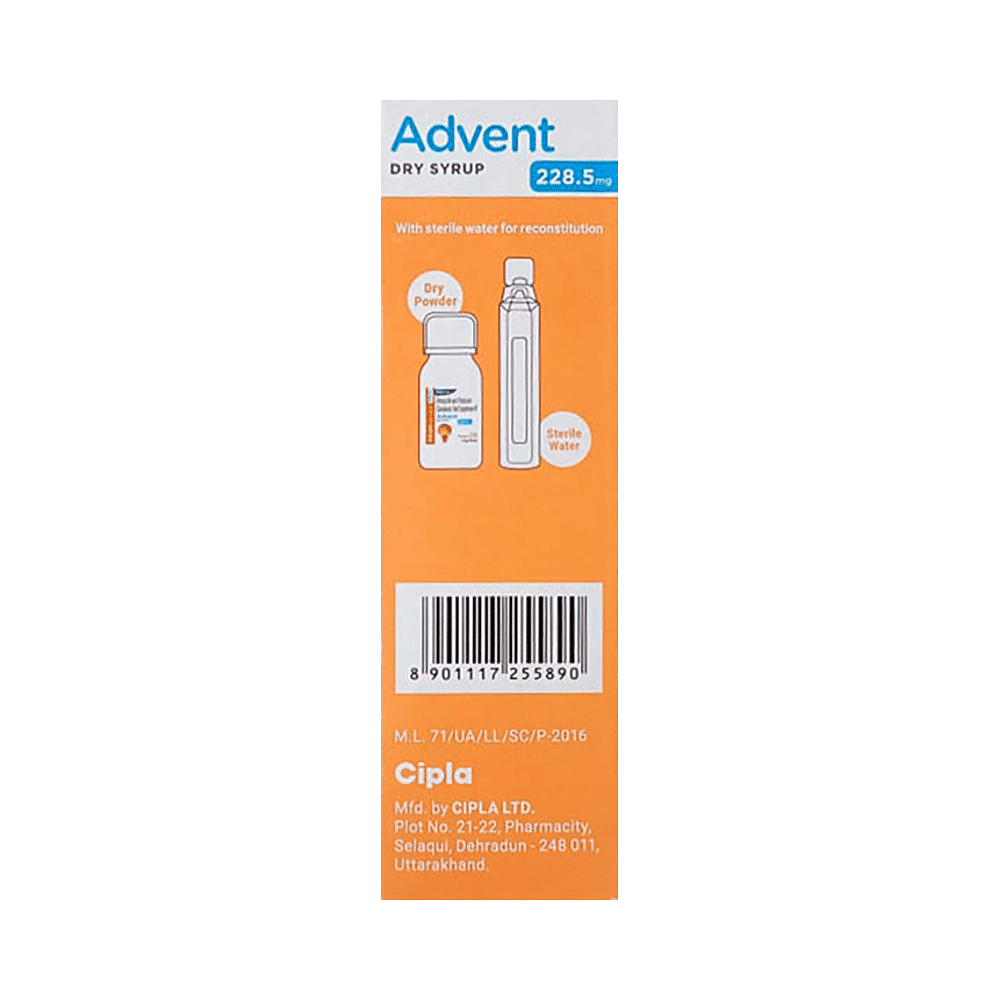
Clavonac Dry Syrup
Manufacturer
Biovec Lifesciences
Salt Composition
Amoxycillin (200mg/5ml) + Clavulanic Acid (28.5mg/5ml)
Key Information
Short Description
Clavonac Dry Syrup is an antibiotic medicine that helps treat bacterial infections of the ear, nose, throat, chest, lungs, teeth, skin, and urinary tract.
Dosage Form
Dry Syrup
Introduction
Clavonac Dry Syrup is an antibiotic medicine that helps treat bacterial infections of the ear, nose, throat, chest, lungs, teeth, skin, and urinary tract. It is capable of killing bacteria that have become resistant to other therapies and thus also helps treat tuberculosis that is resistant to other treatments.
Directions for Use
Never give Clavonac Dry Syrup until and unless prescribed by the doctor. You must also never share your child’s medicine with anyone else even if they show similar symptoms.
How it works
Clavonac Dry Syrup is an antibiotic. It has two active agents amoxycillin and clavulanic acid. Amoxycillin works by preventing the formation of the bacterial protective covering (cell wall) essential for the survival of the bacteria. Whereas clavulanic acid serves a special purpose of inhibiting an enzyme (beta-lactamase) that is produced by resistant bacteria. This makes the combination of amoxycillin and clavulanic acid an effective line of treatment for many types of infections.
Quick Tips
Your child may have a bitter taste in the mouth after the intake of Clavonac Dry Syrup. Eating citrus fruit or sipping plenty of water or fruit juice may help. Encourage your child to drink plenty of water in case diarrhea develops as a side effect. Never give Clavonac Dry Syrup to treat common cold and flu-like symptoms caused by viruses. Do not give Clavonac Dry Syrup to anyone else even if they show similar symptoms. Check ‘expiry’ before giving Clavonac Dry Syrup to your child. Immediately discard all the expired medicines.
Related Medicines

Advent 228.5mg Dry Syrup Tangy Orange

Rosimox CV Dry Syrup

Fermox Dry Syrup

Zestoclav CV Dry Syrup

Naccin Dry Syrup

Daxilin CV Dry Syrup

Selluxy CV Dry Syrup

Moxlair CV Dry Syrup

Zoximox CV Dry Syrup

NV CL Dry Syrup
Frequently asked questions
Can other medicines be given at the same time as Clavonac Dry Syrup?
Clavonac Dry Syrup may interact with other medications. Before starting this medication, tell your child's doctor about all the medicines they are currently taking. It is essential to consult with a healthcare professional for guidance regarding appropriate drug combinations.
Can I get my child vaccinated while on treatment with Clavonac Dry Syrup?
Generally, antibiotics do not interfere with vaccines or cause adverse reactions in children. However, it's crucial to delay vaccinations until after the illness is cleared up. Once your child feels better, the vaccine can be given as per their healthcare provider's recommendations.
Which lab tests may my child undergo while taking Clavonac Dry Syrup on a long-term basis?
Regular monitoring of kidney and liver function is typically recommended during prolonged therapy with Clavonac Dry Syrup. These tests ensure early detection of any potential complications.
Can I give a higher than the recommended dose of Clavonac Dry Syrup to my child?
No, exceeding the recommended dosage may heighten the risk of adverse effects. If your child experiences worsening symptoms, consult with their doctor for further evaluation.
Can I stop giving Clavonac Dry Syrup to my child when the symptoms are relieved?
Stop administering this medication only if directed by a healthcare professional after completing the full course. Even if you notice symptom improvement, remember that Clavonac Dry Syrup may still be beneficial, and continued usage is crucial for complete cure.
Can the use of Clavonac Dry Syrup cause diarrhea?
Yes, Clavonac Dry Syrup can cause diarrhea as it targets bacteria. Additionally, this medication may affect the beneficial bacteria in your child's stomach leading to diarrhea. Encourage your child to drink plenty of fluids if they experience diarrhea. Consult with a healthcare professional for any concerns regarding diarrhea and its duration.
Do all viral common colds result in secondary bacterial infection?
Most often, bacterial infections do not follow viral infections. In fact, prescribing antibiotics during a viral infection might increase your child's risk of developing side effects. Consult with your child's doctor before administering antibiotics.
The mucus coming out of my child’s nose is yellow-green. Is it a sign of a bacterial infection?
A change in mucus color from clear to yellow or green during a common cold is normal. These changes often occur as the body fights off the infection, and symptoms typically last for 7-10 days.
Is there any sign which shows that my child needs immediate medical attention?
Call your child's doctor immediately if they experience severe allergic reactions (difficulty breathing, skin rashes), gastrointestinal problems (diarrhea, vomiting), or liver damage (weakness, paleness, jaundice). While rare, these side effects demand professional medical attention.


